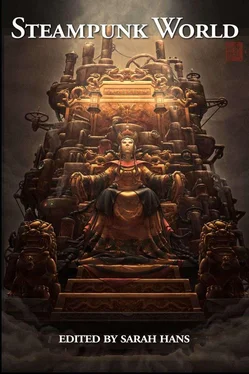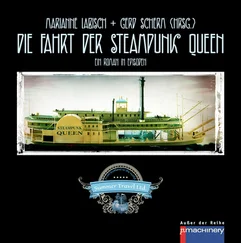Khunying Aunrampha dresses like a commoner, all surface: there’s no smell of smoke or cooking in her clothes, no stains of ink in the creases of her palms, and her fingers are smoother than those of a child grown with the knowledge of harvest in calves and knuckles. Despite this she never looks, quite, soft. Her gaze sees, calculates, and appraises. Her farmer’s hat keeps her features in shadow.
They watch the passage of ducks and a geriatric crocodile that’s become the local fright-tale to unruly children.
“The ma’am paid you a visit.”
Ging doesn’t ask Aunrampha how she came by that information. “Briefly. She wasn’t overly inquisitive.”
“The first farang queen of Siam.” Aunrampha yawns. “From the looks of it, that’s what she aspires to. But you know how monkish His Majesty is, and she’s neither young nor beautiful. Or pleasant. Or witty.”
“I thought she was an instructor in the women’s quarters?”
“Her education is not exceptional for a woman of her station, and she puts on finer airs than she warrants—somewhere up the line there’s a grandmother she doesn’t want named and commoners for parents. She’ll have you believe she’s descended from great commanders. A spy, of course.”
“But His Majesty,” Ging tries.
“Is not infallible. The ma’am is far-traveled and he has faith in her competence to teach us geography, arithmetic, proper Angrit…” Aunrampha cocks her smile the way archers cock arrows. “In her favor, she doesn’t try to convert us like Doctor Bradley did, though really he was a sweet enough man as long as you nodded at the right parts. I still don’t know who Yesu was, but then he never learned to recite Sudsakorn or write proper poetry.”
Ging sights the crocodile’s head amidst a camouflage of driftwood. “Should she come again, what do you want me to do?”
“Nothing. When will your next batch be ready?”
“Two weeks.” She scrunches folds of her pha-nung in one fist. “I thought what I’ve already delivered was sufficient.”
“I’ll call them sufficient when they outnumber western soldiers. I’ll call them enough when they cover the earth from here to the borders of Malaya, and make a wall to guard Bangkok land and shore.” Aunrampha exhales, her mouth softening. “It sits uneasily with you, I know. You’re not a soldier, you haven’t bound yourself to any oath or any cause. If there were other ways I would take them. I want none of this burden on your peace, your heart, your life.”
“It is not that.” But it is precisely that—a selfish horror at what she makes, the thought of the use they could be put to.
It does not help that Aunrampha’s touch pricks her with a frisson of desire; it does not help that Aunrampha’s lips are soft against her own, that the brief kiss recalls everything else they’ve done together and will do. It does not stop Ging from thinking She does this to yoke me to her cause, but is that cause not hers as well, whether or not she is sworn to protecting Siam? Is it not the duty of all who drink and thrive off this soil?
Aunrampha lets go of her, eyes wide and mouth parted. “Perhaps when this is done,” she says softly, “we can share a house, by a forest where old things live, and grow gray together. Away from Bangkok, away from secrets.”
Ging does not say, For too long you’ve promised this, and neither of us is a girl anymore.
The first time Ging saw a doll kill it was an accident.
Ging inherited trade secrets from the mor-phi who taught her to give a doggish sentience to automata. She failed to inherit an eye for weapons or a mind for battlefields from her mother. The dolls were just ornaments, a canvas for her imagination. Lucrative and, when she allowed herself to admire her own work, beautiful. A gift of trade secrets and an alchemical discipline to pass onto Nok.
She no longer remembers the soldier’s face or nationality. She recalls only that they were on her wheelboat, its mechanical paddles churning river water to white froth, Nok regaling her with stories of raising fighting cockerels.
One of Ging’s new automata stood at the prow, holding a gas lamp. She’d chosen a lesser canal cupped between tattered, leaning houses that creaked among themselves like gossiping grandmothers. The doll was her pride, but she didn’t yet want to parade it down the floating markets before it could perform to perfection.
A sound like fifty storms’ worth of thunder. Jeen firecrackers, Ging reasoned back then, before a farang man stumbled into their boat. A moment where it rocked so far Ging could feel the weight of green waters pulling her down, could smell the silt and feel the weeds curling around her ankles. When it steadied the man had taken hold of Nok, a knife to the girl’s eye. He barked something foreign, angry.
Ging did not have time to process—to understand—before the doll opened the man’s throat. An arterial spray. Nok’s lips moving but Ging could hear nothing save the roar between her ears.
On the banks: a compact woman incongruously dressed in loosely knotted pha-khaoma, a dirty shirt, bare feet coated in mud. In her hand she clasped a long pistol, its handle lacquered black.
Ging recognized her at once.
“Jeen make,” the woman said, tucking the pistol into the folds of the pha-khaoma and retying the fabric. “Dear in price, but it pays for itself. I’m sorry for the noise. Nang Ging?”
“You’re Khunying Aunrampha.” Her hearing returned in patches. “Mother’s successor.”
The lady inclined her head. “I’ve that honor and hope to live up to a fraction of her accomplishments.” She gave wai.
Ging nearly leaped backward into the water, would have prostrated if Aunrampha did not stop her.
“You are the daughter of a legend,” the lady said, “and my elder, if by a few years. Doubtless if she’d stayed in Bangkok and reared you in the women’s quarters, you would have taken up this office.”
She could not say that she had disappointed her mother; that her mother—though never saying in so many words—did not judge her fit for that position. “I don’t think so.”
Aunrampha’s gaze was fastened to the doll, which stood tranquil in disregard of the blood dotting its front. Ging had made that one with a giant’s face, fierce red eyes and upturned tusks. She would always wonder afterward if that was an omen, if some premonition had guided her hands.
The lady did not try to touch the doll. But she looked at it and saw what Ging never had. “Did you,” she said, “make this?”
Ging’s mother raised her with an understanding of the world, and it is this: that nations are built and move on war, that weapons are the true language of diplomacy, and that their enemies are not the Phma or the Yuan.
Spymaster. Advisor. Tactician. All three. Mother did not hold an official title, being only a senior servant in the women’s quarters—the highest rank a merchant’s daughter of no particular lineage could aspire to. Yet she commanded respect: Ging had been born in Bangkok, stayed there until she was eight, and she’d seen the regard afforded Mother. A touch of fear.
Away from Bangkok, in the wet remoteness of Ranong, Ging gained three things: a fondness for the southern dialect, an unseemly accent, and a longing for the sleekly muscled southern girls that took her years to untangle and understand—years while those girls turned to boys equally fleet, ones who could dive and fish and wrestle with sharks, if their boasts could be believed. Her mother must have known, but did not care overmuch. It was more imperative that Ging could replace her.
Ging never knew how Mother reached the decision that she could not. But one day Mother summoned an old, old woman and told her a name: Khunying Aunrampha Panthapiyot. Ging overheard that, the name, but did not forget it even as she tasted a relief so great it nearly imploded her lungs.
Читать дальше












